A Report on Emerging Issues and Challenges in the Nursing Field
VerifiedAdded on 2023/06/05
|12
|1316
|197
Report
AI Summary
This report explores the emerging issues and challenges in the nursing field, focusing on staff shortages, remuneration, and burnout. Through interviews with a pediatric ward nurse, an acute care nurse, a nurse manager, and a nurse administrator, the assignment identifies interconnected challenges faced by nurses in different roles. Direct patient care nurses report feeling overburdened by workload and stress, while administrative nurses grapple with staff shortages and workload management. The report highlights the links between these issues, particularly the impact of staff shortages on burnout and the connection between remuneration and economic factors. The author's professional interest lies in administrative roles, with a focus on mitigating the impact of staff shortage and burnout. The experience underscored the importance of soft skills and provided insights into the challenges within the author's chosen designation. Desklib provides access to similar solved assignments and past papers for students.
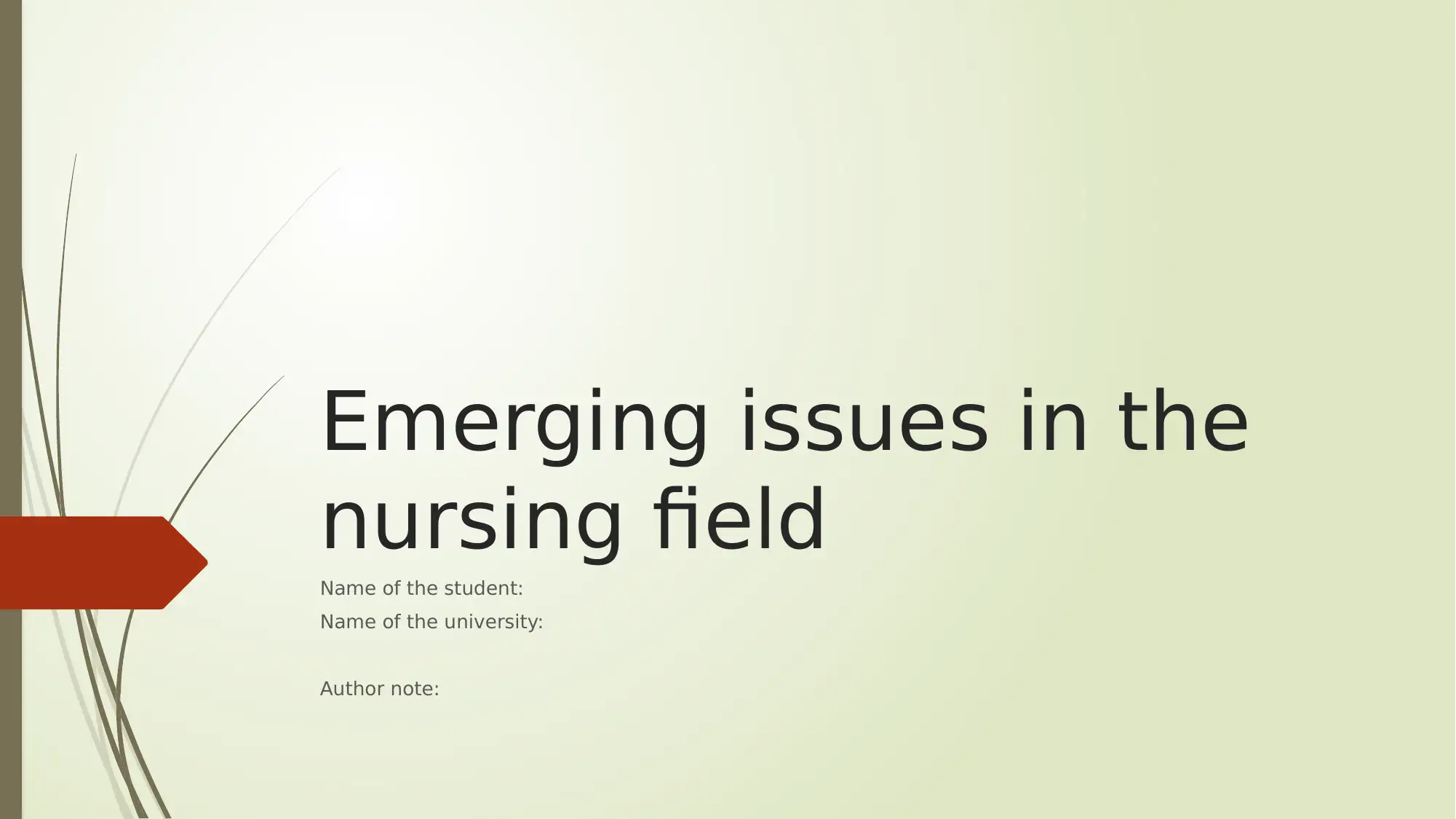
Emerging issues in the
nursing field
Name of the student:
Name of the university:
Author note:
nursing field
Name of the student:
Name of the university:
Author note:
Paraphrase This Document
Need a fresh take? Get an instant paraphrase of this document with our AI Paraphraser
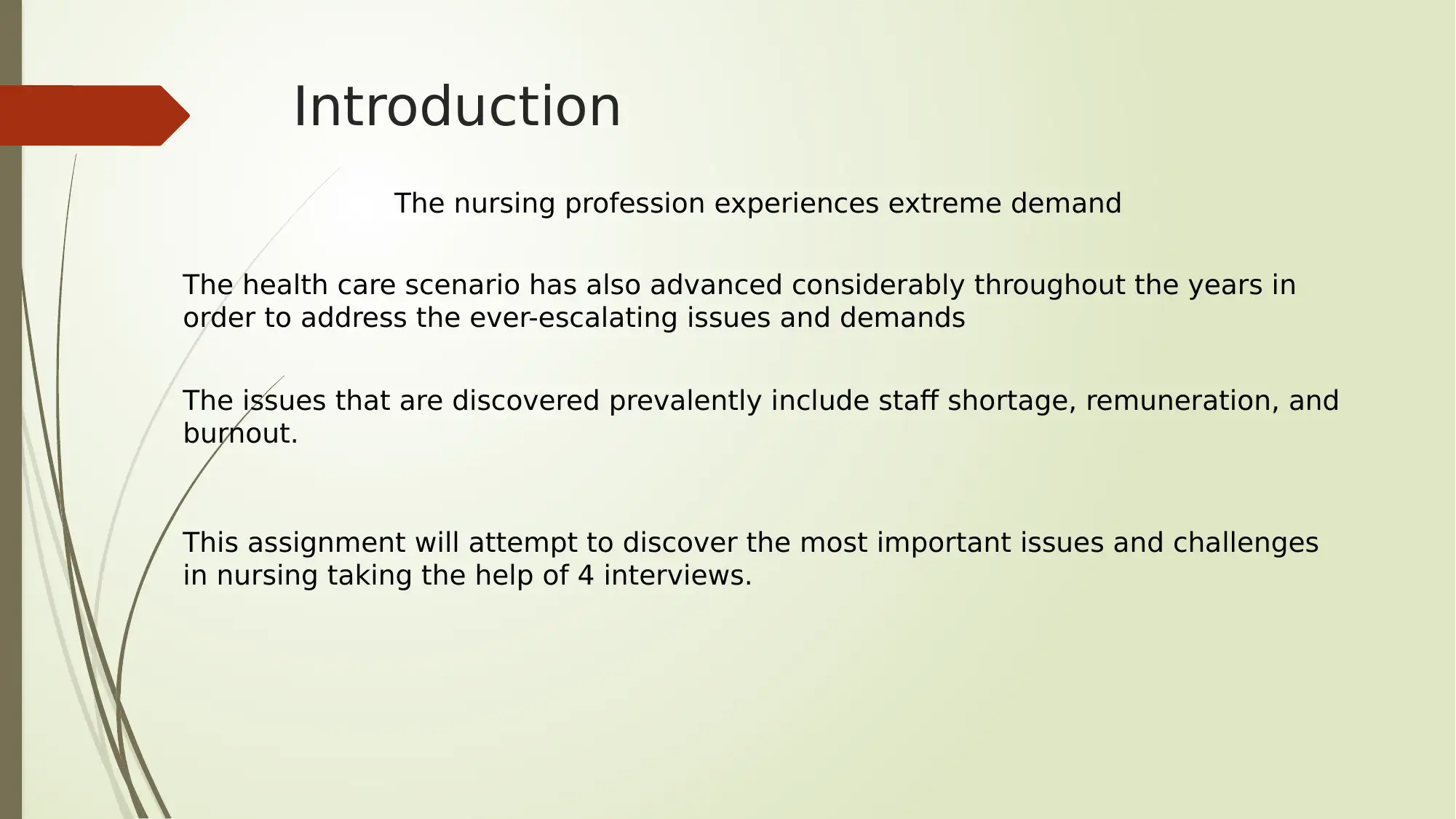
Introduction
The nursing profession experiences extreme demand
The health care scenario has also advanced considerably throughout the years in
order to address the ever-escalating issues and demands
The issues that are discovered prevalently include staff shortage, remuneration, and
burnout.
This assignment will attempt to discover the most important issues and challenges
in nursing taking the help of 4 interviews.
The nursing profession experiences extreme demand
The health care scenario has also advanced considerably throughout the years in
order to address the ever-escalating issues and demands
The issues that are discovered prevalently include staff shortage, remuneration, and
burnout.
This assignment will attempt to discover the most important issues and challenges
in nursing taking the help of 4 interviews.
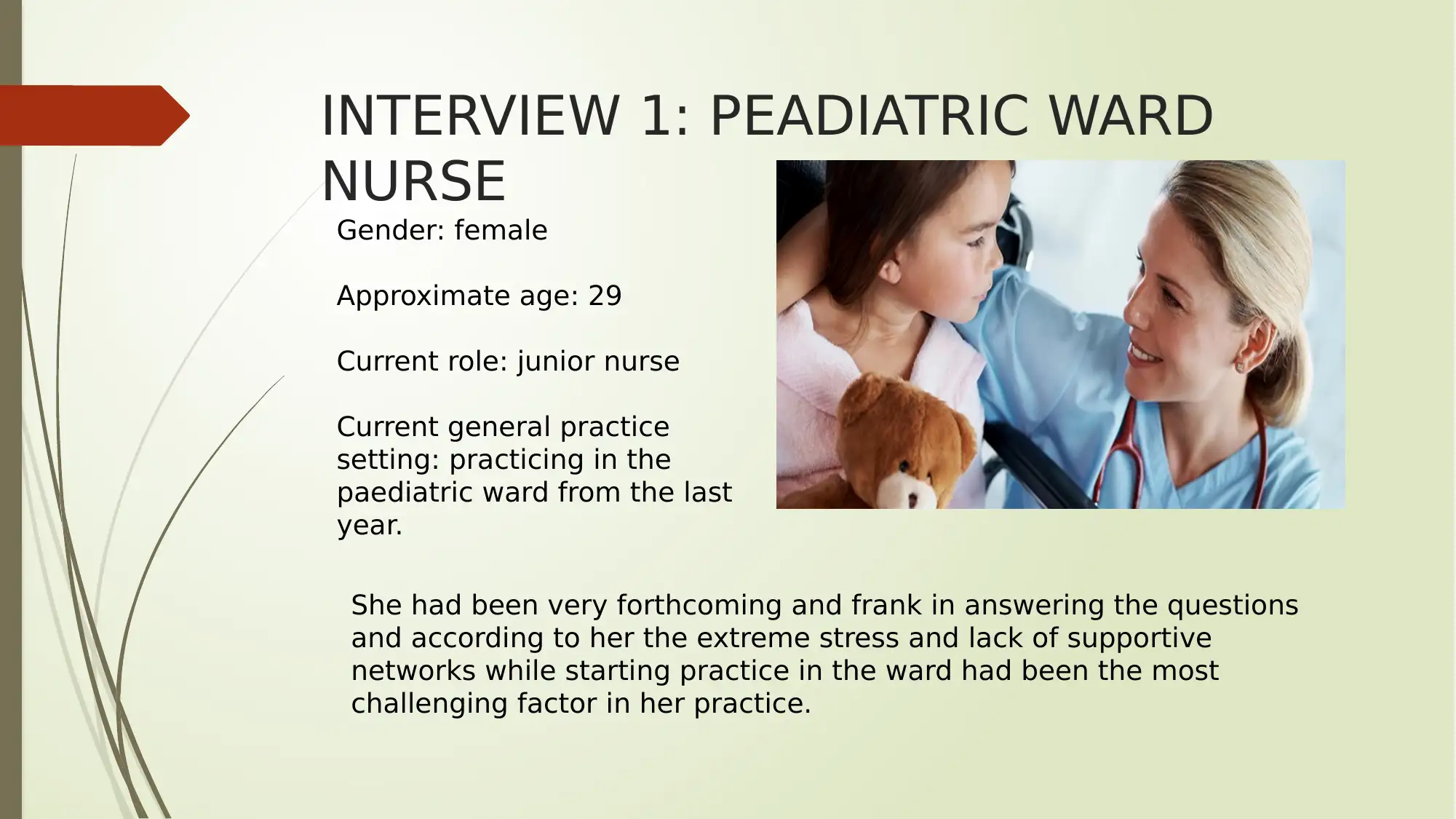
INTERVIEW 1: PEADIATRIC WARD
NURSE
Gender: female
Approximate age: 29
Current role: junior nurse
Current general practice
setting: practicing in the
paediatric ward from the last
year.
She had been very forthcoming and frank in answering the questions
and according to her the extreme stress and lack of supportive
networks while starting practice in the ward had been the most
challenging factor in her practice.
NURSE
Gender: female
Approximate age: 29
Current role: junior nurse
Current general practice
setting: practicing in the
paediatric ward from the last
year.
She had been very forthcoming and frank in answering the questions
and according to her the extreme stress and lack of supportive
networks while starting practice in the ward had been the most
challenging factor in her practice.
⊘ This is a preview!⊘
Do you want full access?
Subscribe today to unlock all pages.

Trusted by 1+ million students worldwide
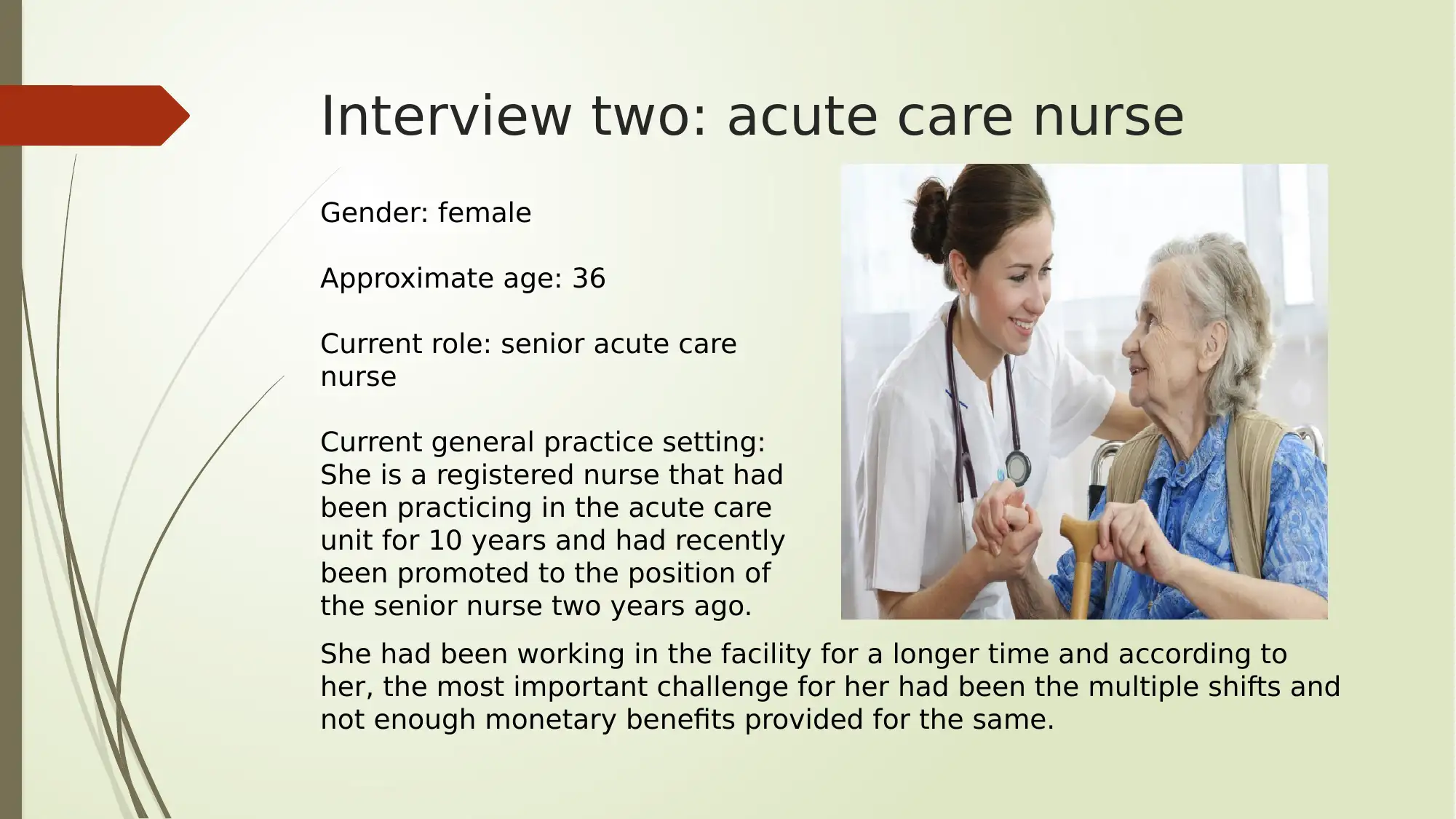
Interview two: acute care nurse
Gender: female
Approximate age: 36
Current role: senior acute care
nurse
Current general practice setting:
She is a registered nurse that had
been practicing in the acute care
unit for 10 years and had recently
been promoted to the position of
the senior nurse two years ago.
She had been working in the facility for a longer time and according to
her, the most important challenge for her had been the multiple shifts and
not enough monetary benefits provided for the same.
Gender: female
Approximate age: 36
Current role: senior acute care
nurse
Current general practice setting:
She is a registered nurse that had
been practicing in the acute care
unit for 10 years and had recently
been promoted to the position of
the senior nurse two years ago.
She had been working in the facility for a longer time and according to
her, the most important challenge for her had been the multiple shifts and
not enough monetary benefits provided for the same.
Paraphrase This Document
Need a fresh take? Get an instant paraphrase of this document with our AI Paraphraser
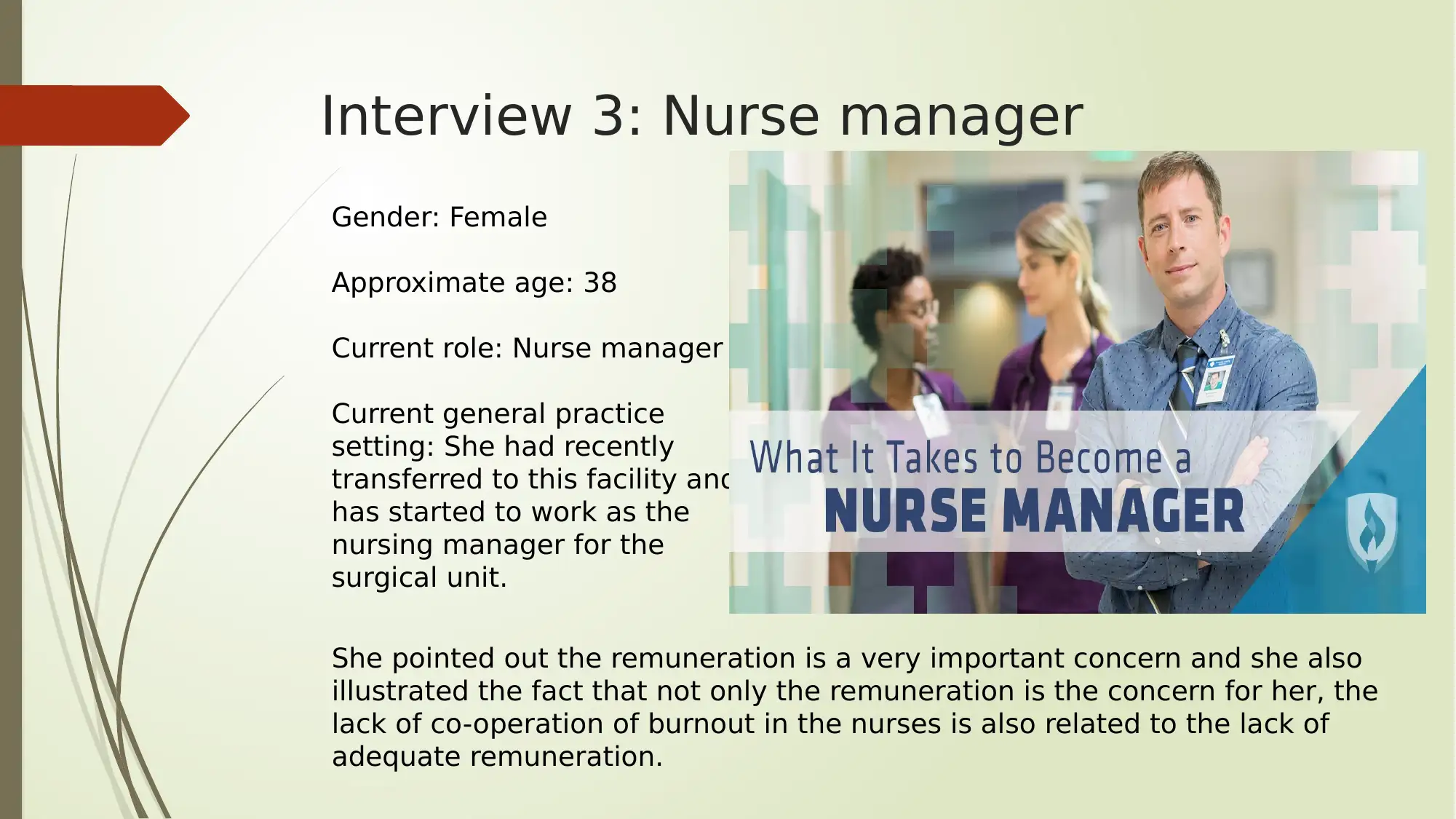
Interview 3: Nurse manager
Gender: Female
Approximate age: 38
Current role: Nurse manager
Current general practice
setting: She had recently
transferred to this facility and
has started to work as the
nursing manager for the
surgical unit.
She pointed out the remuneration is a very important concern and she also
illustrated the fact that not only the remuneration is the concern for her, the
lack of co-operation of burnout in the nurses is also related to the lack of
adequate remuneration.
Gender: Female
Approximate age: 38
Current role: Nurse manager
Current general practice
setting: She had recently
transferred to this facility and
has started to work as the
nursing manager for the
surgical unit.
She pointed out the remuneration is a very important concern and she also
illustrated the fact that not only the remuneration is the concern for her, the
lack of co-operation of burnout in the nurses is also related to the lack of
adequate remuneration.
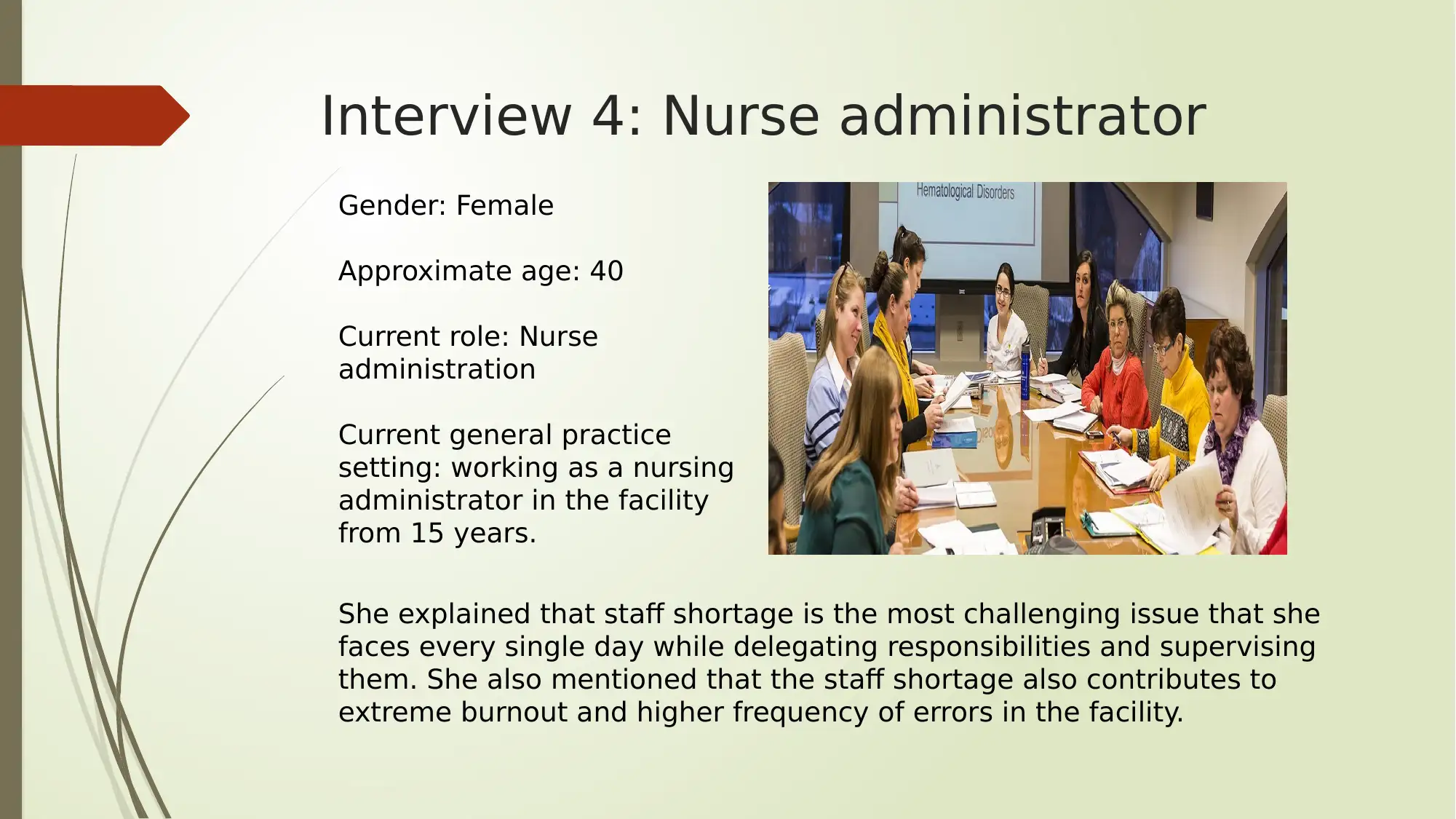
Interview 4: Nurse administrator
Gender: Female
Approximate age: 40
Current role: Nurse
administration
Current general practice
setting: working as a nursing
administrator in the facility
from 15 years.
She explained that staff shortage is the most challenging issue that she
faces every single day while delegating responsibilities and supervising
them. She also mentioned that the staff shortage also contributes to
extreme burnout and higher frequency of errors in the facility.
Gender: Female
Approximate age: 40
Current role: Nurse
administration
Current general practice
setting: working as a nursing
administrator in the facility
from 15 years.
She explained that staff shortage is the most challenging issue that she
faces every single day while delegating responsibilities and supervising
them. She also mentioned that the staff shortage also contributes to
extreme burnout and higher frequency of errors in the facility.
⊘ This is a preview!⊘
Do you want full access?
Subscribe today to unlock all pages.

Trusted by 1+ million students worldwide
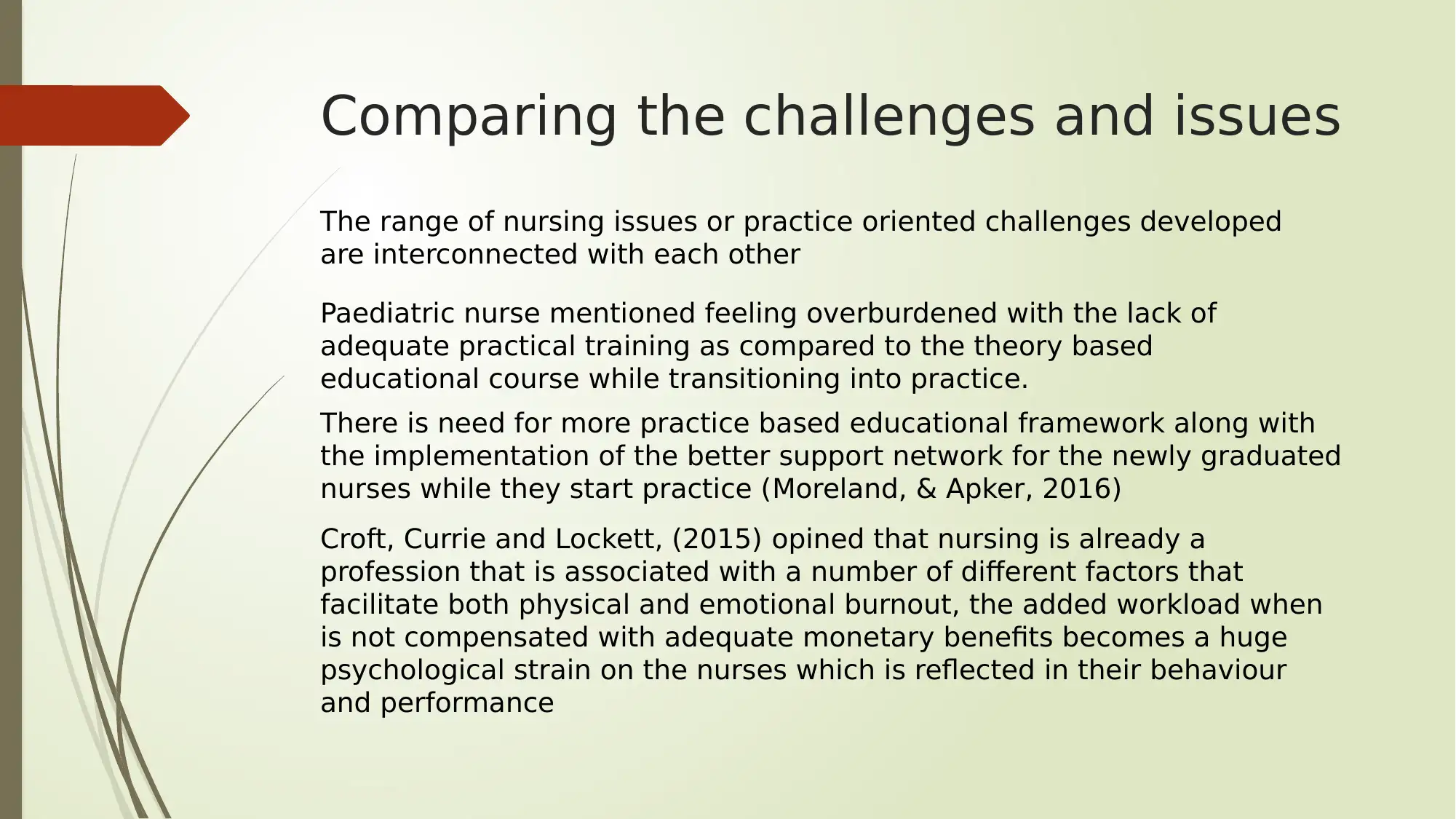
Comparing the challenges and issues
The range of nursing issues or practice oriented challenges developed
are interconnected with each other
Paediatric nurse mentioned feeling overburdened with the lack of
adequate practical training as compared to the theory based
educational course while transitioning into practice.
There is need for more practice based educational framework along with
the implementation of the better support network for the newly graduated
nurses while they start practice (Moreland, & Apker, 2016)
Croft, Currie and Lockett, (2015) opined that nursing is already a
profession that is associated with a number of different factors that
facilitate both physical and emotional burnout, the added workload when
is not compensated with adequate monetary benefits becomes a huge
psychological strain on the nurses which is reflected in their behaviour
and performance
The range of nursing issues or practice oriented challenges developed
are interconnected with each other
Paediatric nurse mentioned feeling overburdened with the lack of
adequate practical training as compared to the theory based
educational course while transitioning into practice.
There is need for more practice based educational framework along with
the implementation of the better support network for the newly graduated
nurses while they start practice (Moreland, & Apker, 2016)
Croft, Currie and Lockett, (2015) opined that nursing is already a
profession that is associated with a number of different factors that
facilitate both physical and emotional burnout, the added workload when
is not compensated with adequate monetary benefits becomes a huge
psychological strain on the nurses which is reflected in their behaviour
and performance
Paraphrase This Document
Need a fresh take? Get an instant paraphrase of this document with our AI Paraphraser
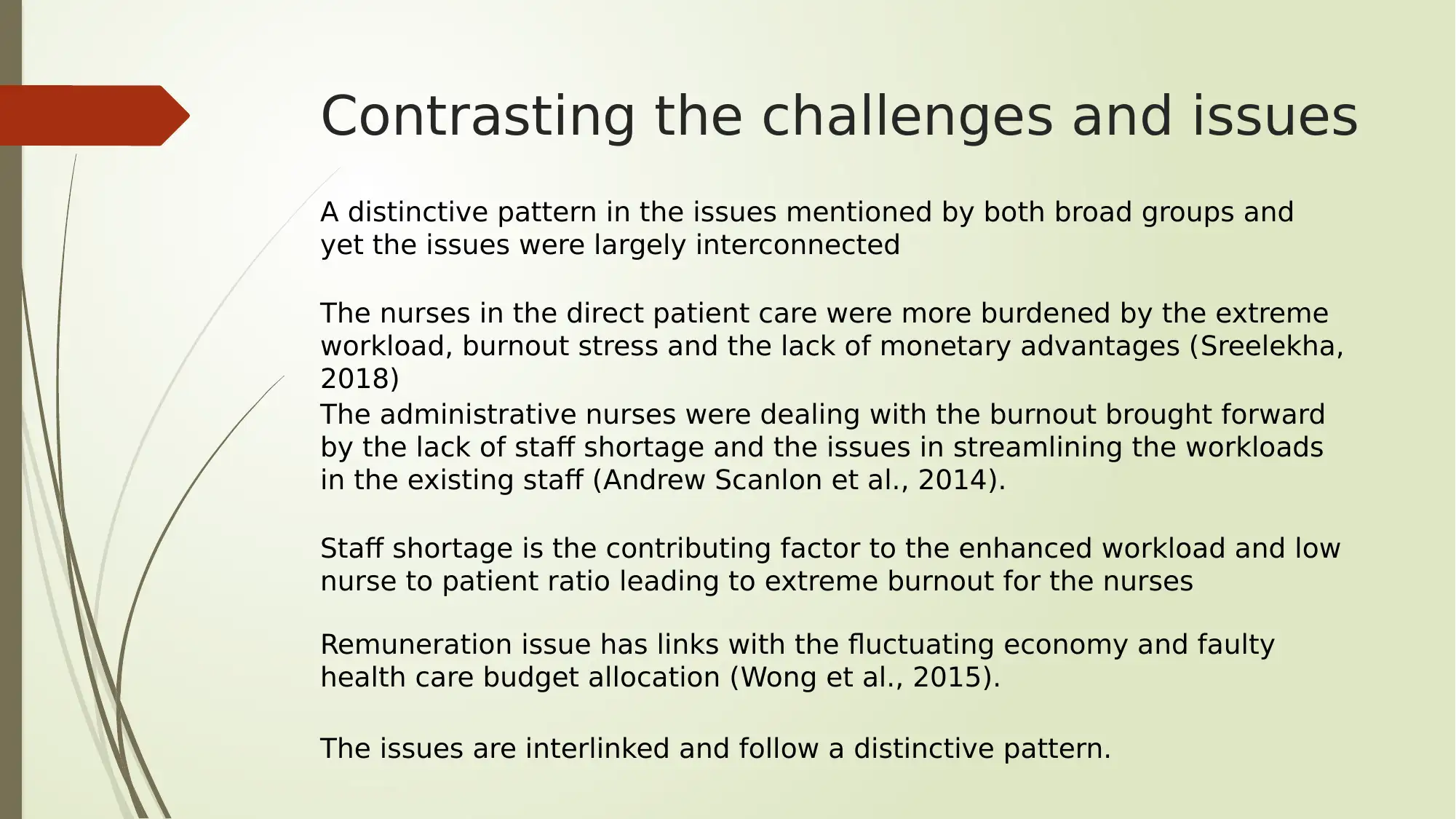
Contrasting the challenges and issues
A distinctive pattern in the issues mentioned by both broad groups and
yet the issues were largely interconnected
The nurses in the direct patient care were more burdened by the extreme
workload, burnout stress and the lack of monetary advantages (Sreelekha,
2018)
The administrative nurses were dealing with the burnout brought forward
by the lack of staff shortage and the issues in streamlining the workloads
in the existing staff (Andrew Scanlon et al., 2014).
Staff shortage is the contributing factor to the enhanced workload and low
nurse to patient ratio leading to extreme burnout for the nurses
Remuneration issue has links with the fluctuating economy and faulty
health care budget allocation (Wong et al., 2015).
The issues are interlinked and follow a distinctive pattern.
A distinctive pattern in the issues mentioned by both broad groups and
yet the issues were largely interconnected
The nurses in the direct patient care were more burdened by the extreme
workload, burnout stress and the lack of monetary advantages (Sreelekha,
2018)
The administrative nurses were dealing with the burnout brought forward
by the lack of staff shortage and the issues in streamlining the workloads
in the existing staff (Andrew Scanlon et al., 2014).
Staff shortage is the contributing factor to the enhanced workload and low
nurse to patient ratio leading to extreme burnout for the nurses
Remuneration issue has links with the fluctuating economy and faulty
health care budget allocation (Wong et al., 2015).
The issues are interlinked and follow a distinctive pattern.
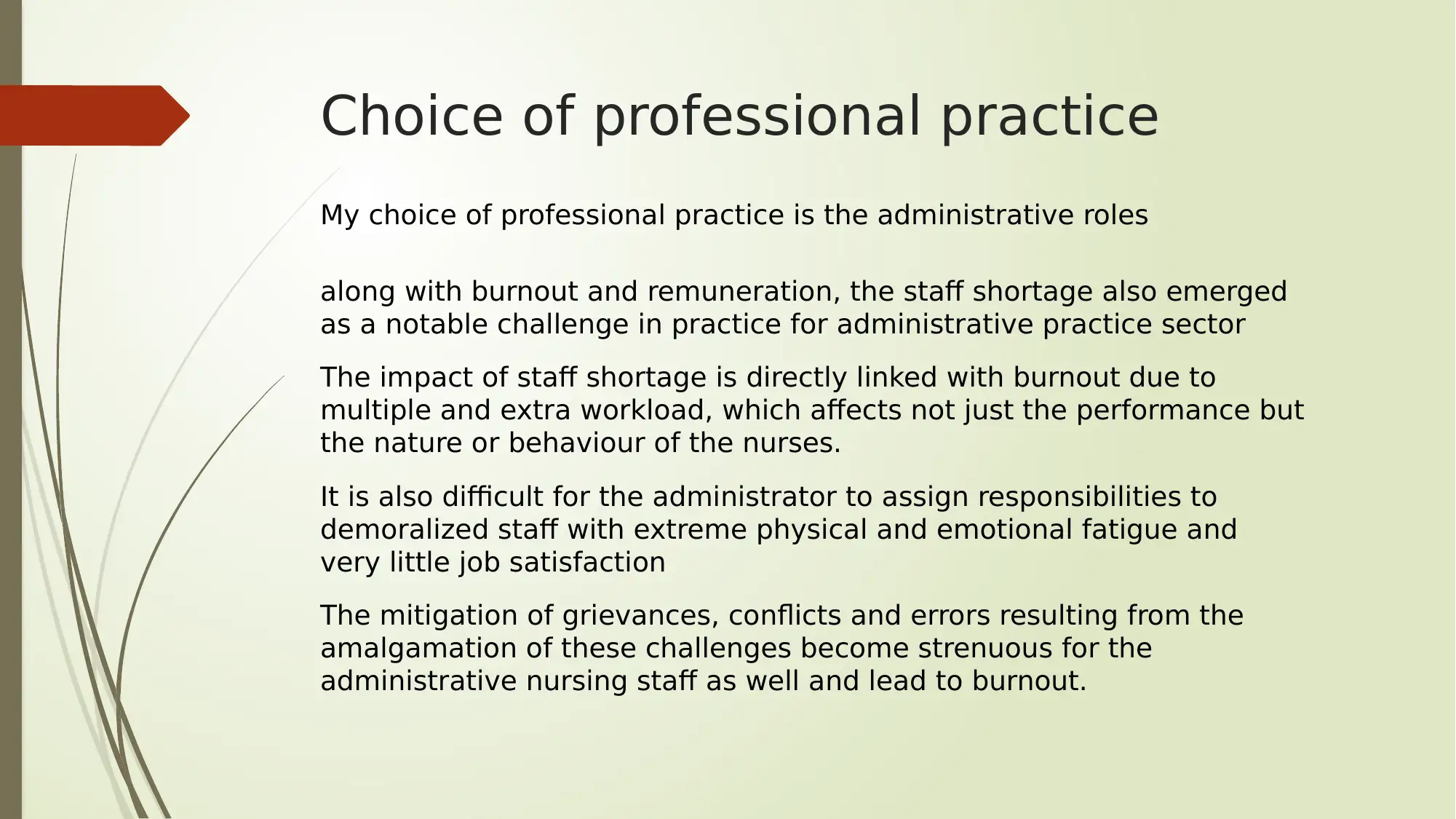
Choice of professional practice
My choice of professional practice is the administrative roles
along with burnout and remuneration, the staff shortage also emerged
as a notable challenge in practice for administrative practice sector
The impact of staff shortage is directly linked with burnout due to
multiple and extra workload, which affects not just the performance but
the nature or behaviour of the nurses.
It is also difficult for the administrator to assign responsibilities to
demoralized staff with extreme physical and emotional fatigue and
very little job satisfaction
The mitigation of grievances, conflicts and errors resulting from the
amalgamation of these challenges become strenuous for the
administrative nursing staff as well and lead to burnout.
My choice of professional practice is the administrative roles
along with burnout and remuneration, the staff shortage also emerged
as a notable challenge in practice for administrative practice sector
The impact of staff shortage is directly linked with burnout due to
multiple and extra workload, which affects not just the performance but
the nature or behaviour of the nurses.
It is also difficult for the administrator to assign responsibilities to
demoralized staff with extreme physical and emotional fatigue and
very little job satisfaction
The mitigation of grievances, conflicts and errors resulting from the
amalgamation of these challenges become strenuous for the
administrative nursing staff as well and lead to burnout.
⊘ This is a preview!⊘
Do you want full access?
Subscribe today to unlock all pages.

Trusted by 1+ million students worldwide
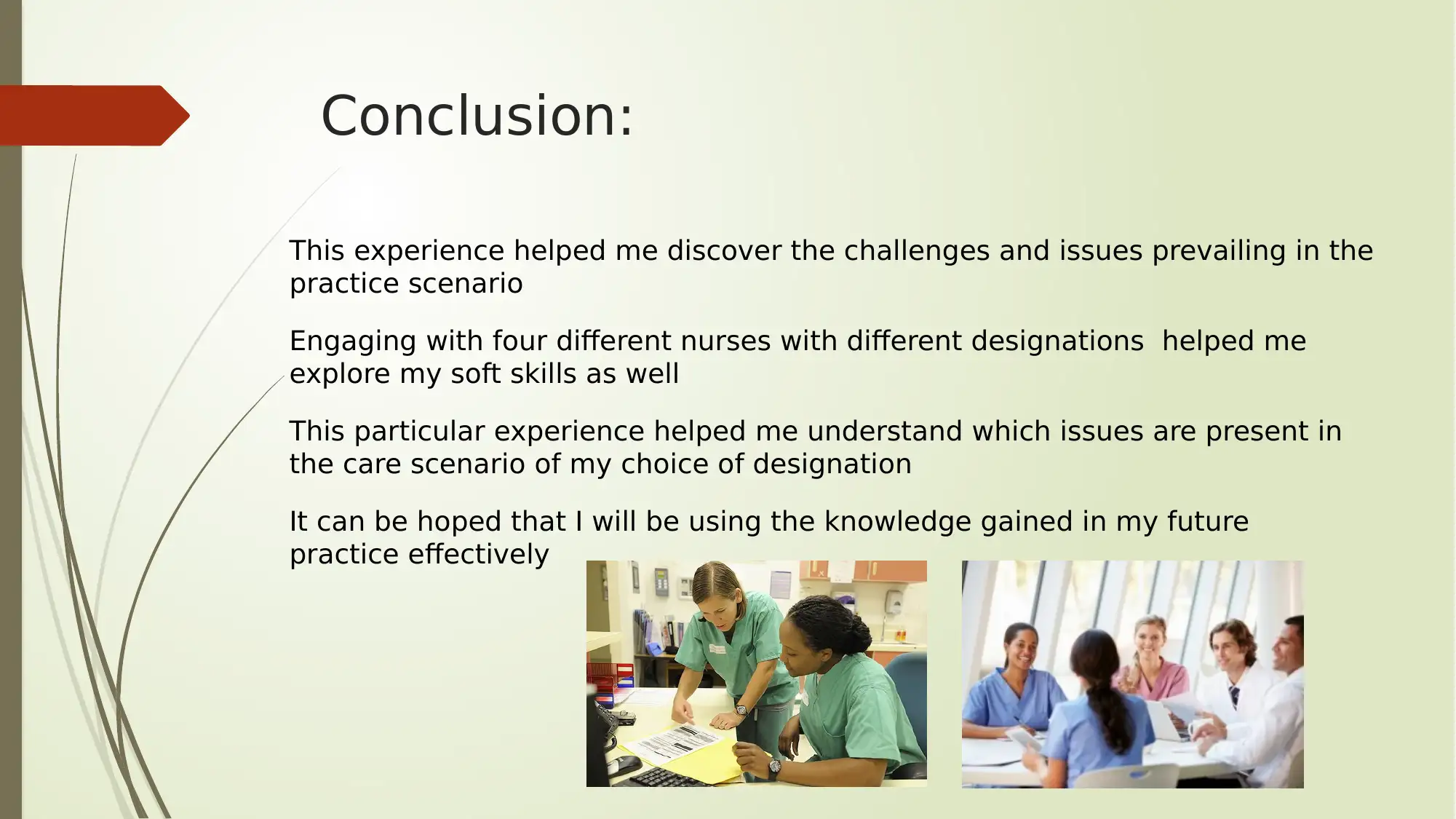
Conclusion:
This experience helped me discover the challenges and issues prevailing in the
practice scenario
Engaging with four different nurses with different designations helped me
explore my soft skills as well
This particular experience helped me understand which issues are present in
the care scenario of my choice of designation
It can be hoped that I will be using the knowledge gained in my future
practice effectively
This experience helped me discover the challenges and issues prevailing in the
practice scenario
Engaging with four different nurses with different designations helped me
explore my soft skills as well
This particular experience helped me understand which issues are present in
the care scenario of my choice of designation
It can be hoped that I will be using the knowledge gained in my future
practice effectively
Paraphrase This Document
Need a fresh take? Get an instant paraphrase of this document with our AI Paraphraser
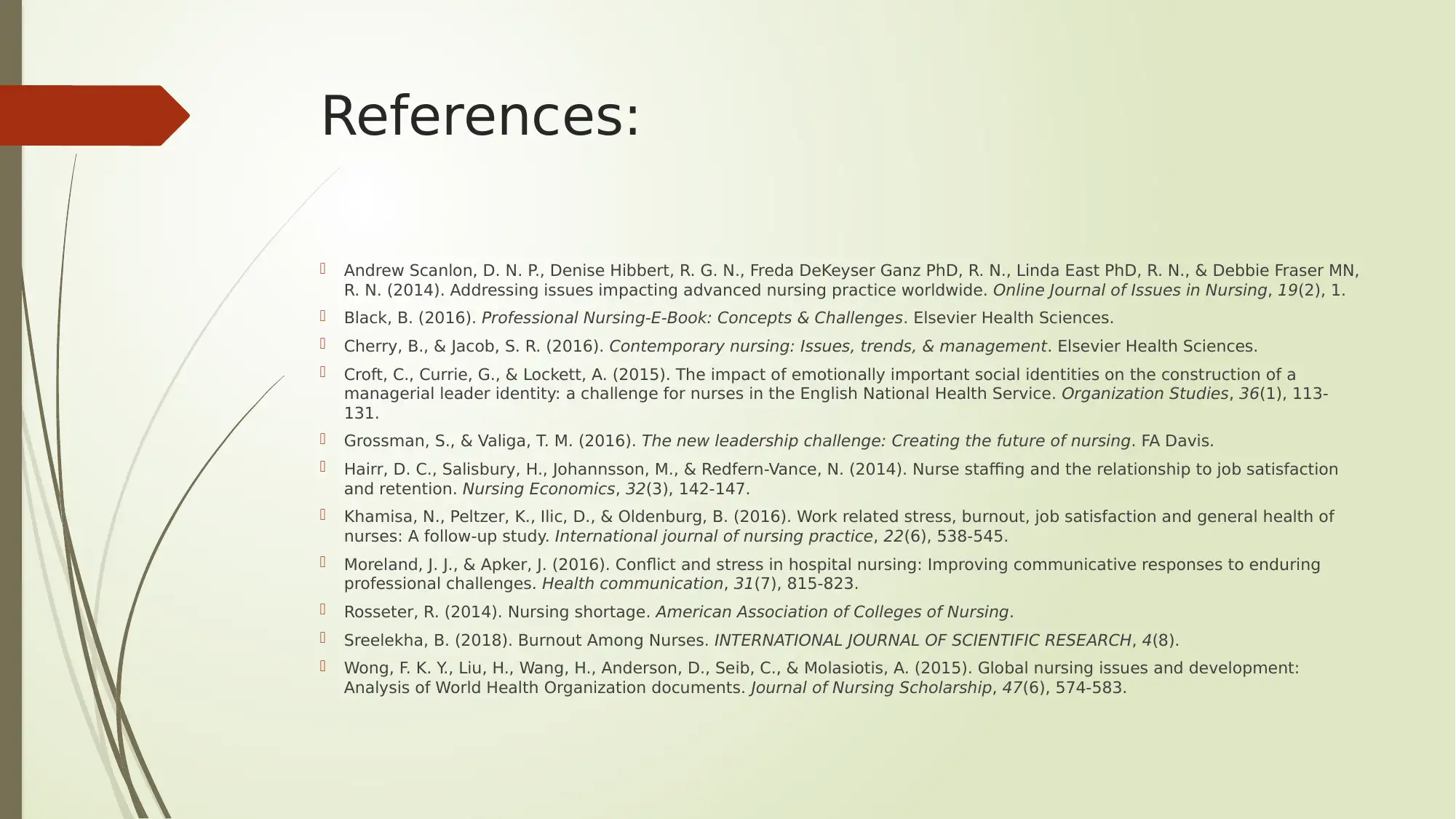
References:
Andrew Scanlon, D. N. P., Denise Hibbert, R. G. N., Freda DeKeyser Ganz PhD, R. N., Linda East PhD, R. N., & Debbie Fraser MN,
R. N. (2014). Addressing issues impacting advanced nursing practice worldwide. Online Journal of Issues in Nursing, 19(2), 1.
Black, B. (2016). Professional Nursing-E-Book: Concepts & Challenges. Elsevier Health Sciences.
Cherry, B., & Jacob, S. R. (2016). Contemporary nursing: Issues, trends, & management. Elsevier Health Sciences.
Croft, C., Currie, G., & Lockett, A. (2015). The impact of emotionally important social identities on the construction of a
managerial leader identity: a challenge for nurses in the English National Health Service. Organization Studies, 36(1), 113-
131.
Grossman, S., & Valiga, T. M. (2016). The new leadership challenge: Creating the future of nursing. FA Davis.
Hairr, D. C., Salisbury, H., Johannsson, M., & Redfern-Vance, N. (2014). Nurse staffing and the relationship to job satisfaction
and retention. Nursing Economics, 32(3), 142-147.
Khamisa, N., Peltzer, K., Ilic, D., & Oldenburg, B. (2016). Work related stress, burnout, job satisfaction and general health of
nurses: A follow‐up study. International journal of nursing practice, 22(6), 538-545.
Moreland, J. J., & Apker, J. (2016). Conflict and stress in hospital nursing: Improving communicative responses to enduring
professional challenges. Health communication, 31(7), 815-823.
Rosseter, R. (2014). Nursing shortage. American Association of Colleges of Nursing.
Sreelekha, B. (2018). Burnout Among Nurses. INTERNATIONAL JOURNAL OF SCIENTIFIC RESEARCH, 4(8).
Wong, F. K. Y., Liu, H., Wang, H., Anderson, D., Seib, C., & Molasiotis, A. (2015). Global nursing issues and development:
Analysis of World Health Organization documents. Journal of Nursing Scholarship, 47(6), 574-583.
Andrew Scanlon, D. N. P., Denise Hibbert, R. G. N., Freda DeKeyser Ganz PhD, R. N., Linda East PhD, R. N., & Debbie Fraser MN,
R. N. (2014). Addressing issues impacting advanced nursing practice worldwide. Online Journal of Issues in Nursing, 19(2), 1.
Black, B. (2016). Professional Nursing-E-Book: Concepts & Challenges. Elsevier Health Sciences.
Cherry, B., & Jacob, S. R. (2016). Contemporary nursing: Issues, trends, & management. Elsevier Health Sciences.
Croft, C., Currie, G., & Lockett, A. (2015). The impact of emotionally important social identities on the construction of a
managerial leader identity: a challenge for nurses in the English National Health Service. Organization Studies, 36(1), 113-
131.
Grossman, S., & Valiga, T. M. (2016). The new leadership challenge: Creating the future of nursing. FA Davis.
Hairr, D. C., Salisbury, H., Johannsson, M., & Redfern-Vance, N. (2014). Nurse staffing and the relationship to job satisfaction
and retention. Nursing Economics, 32(3), 142-147.
Khamisa, N., Peltzer, K., Ilic, D., & Oldenburg, B. (2016). Work related stress, burnout, job satisfaction and general health of
nurses: A follow‐up study. International journal of nursing practice, 22(6), 538-545.
Moreland, J. J., & Apker, J. (2016). Conflict and stress in hospital nursing: Improving communicative responses to enduring
professional challenges. Health communication, 31(7), 815-823.
Rosseter, R. (2014). Nursing shortage. American Association of Colleges of Nursing.
Sreelekha, B. (2018). Burnout Among Nurses. INTERNATIONAL JOURNAL OF SCIENTIFIC RESEARCH, 4(8).
Wong, F. K. Y., Liu, H., Wang, H., Anderson, D., Seib, C., & Molasiotis, A. (2015). Global nursing issues and development:
Analysis of World Health Organization documents. Journal of Nursing Scholarship, 47(6), 574-583.

⊘ This is a preview!⊘
Do you want full access?
Subscribe today to unlock all pages.

Trusted by 1+ million students worldwide
1 out of 12
Related Documents
Your All-in-One AI-Powered Toolkit for Academic Success.
+13062052269
info@desklib.com
Available 24*7 on WhatsApp / Email
![[object Object]](/_next/static/media/star-bottom.7253800d.svg)
Unlock your academic potential
Copyright © 2020–2025 A2Z Services. All Rights Reserved. Developed and managed by ZUCOL.




